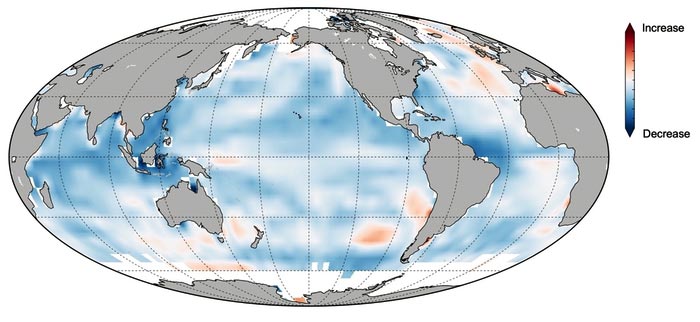World’s ocean is losing its memory under global warming

Declining ocean memory between the present and the end of the 21st century--blue indicates decline, red indicates increase in memory.
Credit: Shi, et al. (2022)
Using future projections from the latest generation of Earth System Models, a recent study published in Science Advances found that most of the world’s ocean is steadily losing its year-to-year memory under global warming.
Compared with the fast weather fluctuations of the atmosphere, the slowly varying ocean exhibits strong persistence, or “memory”, meaning the ocean temperature tomorrow is likely to look a lot like it does today, with only slight changes. As a result, ocean memory is often used for predicting ocean conditions.
Ocean memory decline is found as a collective response across the climate models to human-induced warming. As greenhouse-gas concentrations continue to rise, such memory decline will become increasingly evident.
“We discovered this phenomenon by examining the similarity in ocean surface temperature from one year to the next as a simple metric for ocean memory,” said Hui Shi, lead author and researcher at the Farallon Institute in Petaluma, California. “It’s almost as if the ocean is developing amnesia.”
Ocean memory is found to be related to the thickness of the uppermost layer of the ocean, known as the mixed layer. Deeper mixed layers have greater heat content, which confers more thermal inertia that translates into memory. However, the mixed layer over most oceans will become shallower in response to continued anthropogenic warming, resulting in a decline in ocean memory.
“Other processes, such as changes in ocean currents and changes in the energy exchange between the atmosphere and ocean, also contribute to changes in ocean memory, but the shoaling of the mixed layer depth and resulting memory decline happens in all regions of the globe, and this makes it an important factor to consider for future climate predictions,” said Robert Jnglin Wills, a research scientist at University of Washington in Seattle, Washington, and co-author of the research.
Along with ocean memory decline, the thinning mixed layer is also found to increase the random fluctuations of the sea surface temperature. As a result, although the ocean will not become much more variable from one year to the next in the future, the fraction of helpful signals for prediction largely reduces.
“Reduced ocean memory together with increased random fluctuations suggest intrinsic changes in the system and new challenges in prediction under warming,” said Fei-Fei Jin, an atmospheric sciences professor at the University of Hawai‘i at Mānoa School of Ocean and Earth Science and Technology, and co-author of the research.
Ocean memory loss doesn’t just impact the prediction of physical variables, but could also influence the way we manage sensitive marine ecosystems.
“Reduced memory means less time in advance for a forecast to be made. This could hinder our ability to predict and prepare for ocean change including marine heatwaves, which are known to have caused sudden and pronounced changes in ocean ecosystems around the world,” said Michael Jacox, a research scientist at NOAA Fisheries’ Southwest Fisheries Science Center in Monterey, California, and co-author of the research.
In fisheries management, the biological parameters used for stock assessment are estimated assuming a stable environment represented by the recent past. Reduced ocean memory might render such estimation inaccurate and calls for new approaches in ecosystem-based fisheries management to include real-time ocean monitoring and other efforts alike. Ocean memory decline also likely exerts impacts on populations of biological resources. Depending on whether the species are adapted to constant or more variable environmental conditions, future changes in their population can be better estimated and predicted by taking ocean memory loss into consideration.
Besides ocean prediction, forecasting land-based impacts on temperature, precipitation as well as extreme events might also be affected by ocean memory decline due to their dependence on the persistence of sea surface temperature as a predictability source. As ocean memory continues to decline, researchers will likely be challenged to search for alternative predictors for skillful predictions.
The research is a collaboration among scientists at:
● Farallon Institute
● University of Hawaii at Manoa
● University of Washington
● NOAA Southwest Fisheries Science Center
● NOAA Physical Sciences Laboratory
● University of Arizona
● NOAA Pacific Islands Fisheries Science Center
Journal: Science Advances
DOI: 10.1126/sciadv.abm3468
Method of Research: Data/statistical analysis
Subject of Research: Not applicable
Article Title: Global decline in ocean memory over the 21st century
Article Publication Date: 6-May-2022
COI Statement: The authors declare that they have no competing interests
All latest news from the category: Ecology, The Environment and Conservation
This complex theme deals primarily with interactions between organisms and the environmental factors that impact them, but to a greater extent between individual inanimate environmental factors.
innovations-report offers informative reports and articles on topics such as climate protection, landscape conservation, ecological systems, wildlife and nature parks and ecosystem efficiency and balance.
Newest articles

Innovative 3D printed scaffolds offer new hope for bone healing
Researchers at the Institute for Bioengineering of Catalonia have developed novel 3D printed PLA-CaP scaffolds that promote blood vessel formation, ensuring better healing and regeneration of bone tissue. Bone is…

The surprising role of gut infection in Alzheimer’s disease
ASU- and Banner Alzheimer’s Institute-led study implicates link between a common virus and the disease, which travels from the gut to the brain and may be a target for antiviral…

Molecular gardening: New enzymes discovered for protein modification pruning
How deubiquitinases USP53 and USP54 cleave long polyubiquitin chains and how the former is linked to liver disease in children. Deubiquitinases (DUBs) are enzymes used by cells to trim protein…



